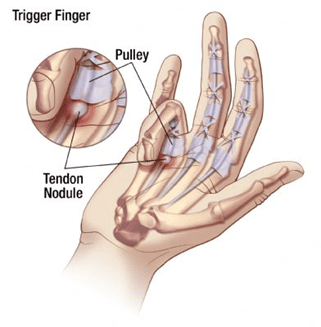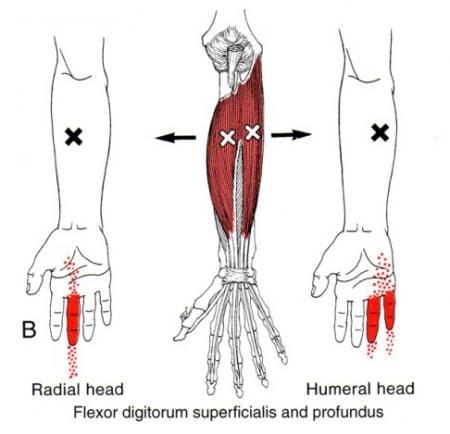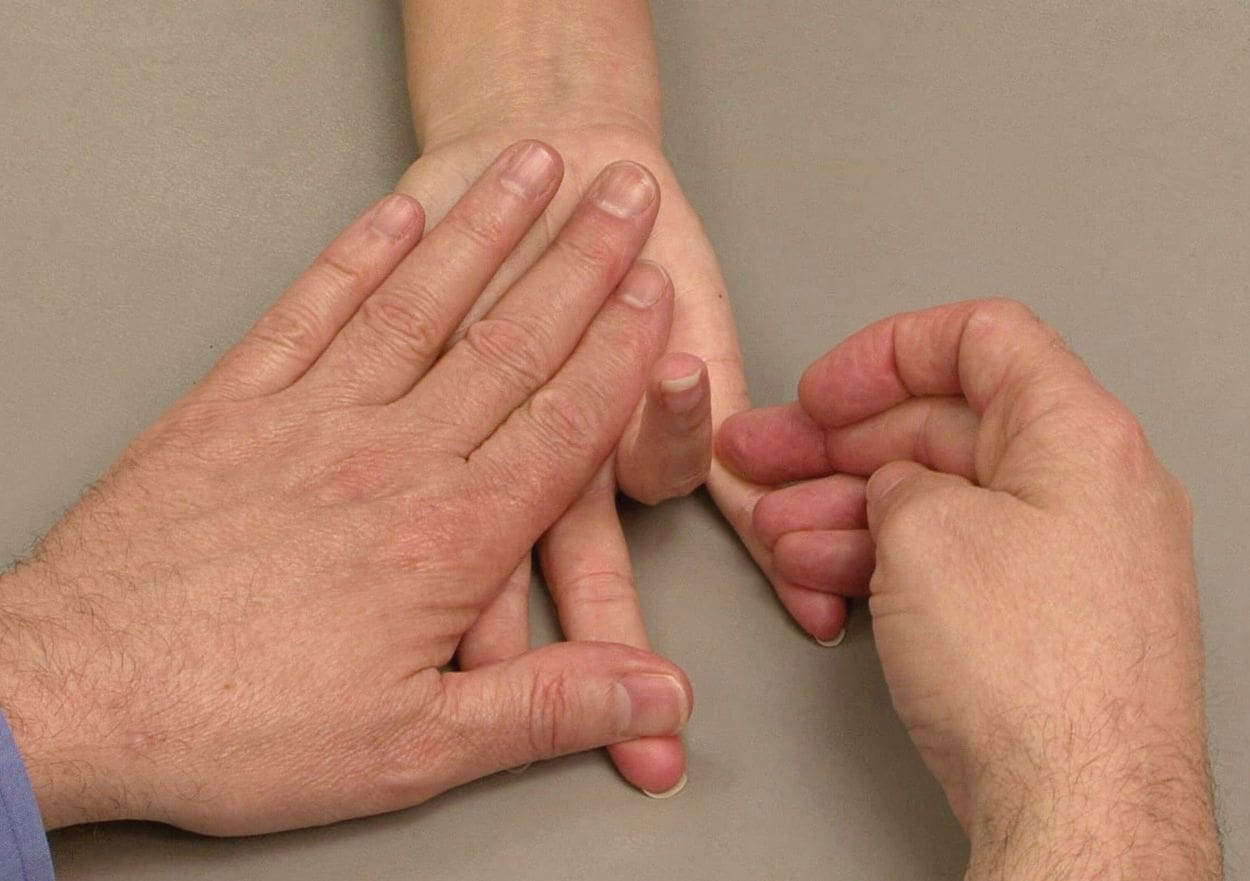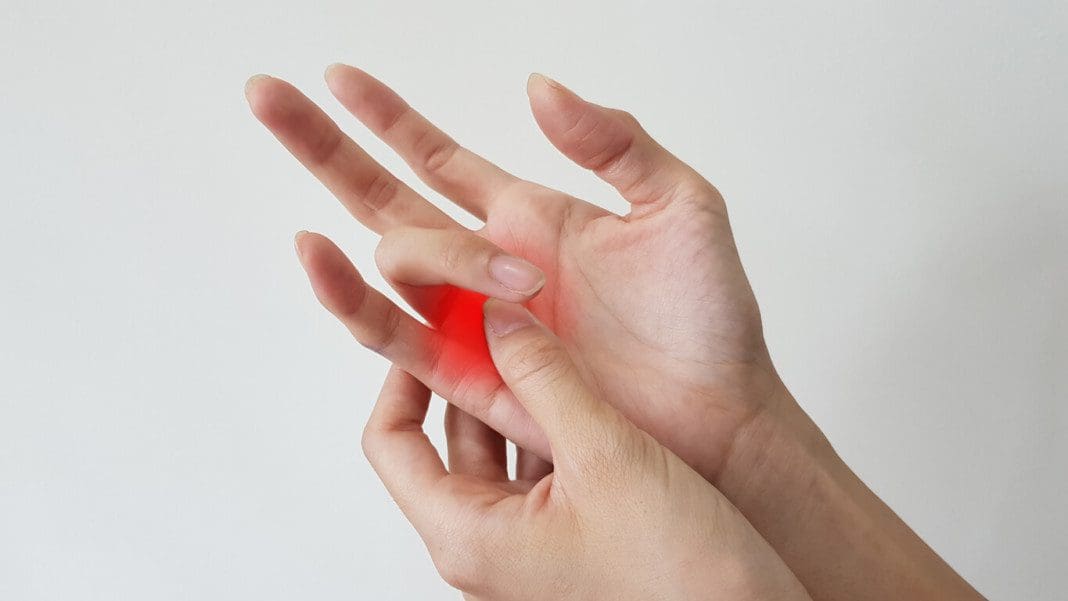Table of Contents
Introduction
When it comes to the body, the hands and fingers correlate with each other by giving the host the grip strength to carry and hold items. The items can range from the smallest to the largest, depending on the item’s weight that a person can physically hold. When the weight becomes overbearingly heavy that a person can not lift or hold, it can lead to unwanted symptoms that overlap with other chronic conditions. To that point, when the hand muscles begin to lose their grip strength, it can lead to the development of trigger points in the affected muscles connected to the hand muscles and tendons. Today’s article looks at a chronic condition associated with trigger points known as trigger fingers, what the symptoms are, and how to treat trigger fingers in the hands. We refer patients to certified providers specializing in hand and wrist pain therapies to aid many people suffering from trigger fingers affecting their hands. We also guide and inform our patients by referring them to our associated medical providers based on their examination when appropriate. We established that education is a great solution to asking our providers profound questions the patient requests. Dr. Jimenez DC takes note of this information as an educational service only. Disclaimer
What Is Trigger Fingers?

Have you encountered stiffness in your fingers? Do you feel pain radiating from your forearms to the palm of your hands? Does it seem difficult to carry or hold items for an extended period? Many people who have dealt with these symptoms believe it is something arthritic or just normal signs of age; however, it could correlate with triggering fingers affecting the hands. Trigger fingers or stenosing tenosynovitis happens when the flexor sheaths in the wrist become overused due to repetitive motions that cause the flexor tendon muscles in the forearm to be inflamed and development issues in the finger joints. This can be very problematic for many individuals who work with their hands as it can cause significant functional impairment to the hands and the fingers. Trigger fingers also commonly affect the individual’s dominant hand and involve the most common digit, the thumb.
The Symptoms

When many individuals are dealing with trigger fingers in their hands, they often complain about their fingers locking up in flexion or extension. When this happens, it can become problematic, as trigger fingers can affect the mobility of the fingers. Some of the symptoms that trigger fingers cause in the digits include:
- Stiffness in the fingers
- Popping or clicking sensations
- Bumps at the base of the finger joint
- Finger catching in a bent position and pops straight
- Finger locking
What is the correlation between diabetes and trigger fingers? Studies reveal that trigger fingers are a multifactorial chronic condition that can occur in anyone, especially those with diabetes. Trigger fingers are diagnosed by palpating a thickened tendon. Other issues cause trigger fingers to form due to active trigger points affecting the flexor muscles in the forearms. According to Dr. Travell, M.D.’s book, “Myofascial Pain and Dysfunction: The Trigger Point Manual,” individuals with active trigger points along their forearm muscles tend to experience difficulty in utilizing mobility strength with their hands. To that point, many individuals may not be able to cup and supinate their hands, extend or flex their fingers, or be able to grip items they are reaching.
An Overview Of Trigger Fingers- Video

Are you dealing with joint stiffness along your fingers? What about feeling pain from flexing or extending their fingers? Or do you feel pain and tenderness in your forearm muscles? Many individuals with these symptoms could be dealing with the pain associated with trigger fingers. Trigger fingers occur when the finger digits suffer from microtrauma by repetitive use or compression forces that invokes pain and inflammation along the tendons of the fingers. The video above overviews trigger fingers, their symptoms, and how to diagnose and treat trigger fingers in the hands. Many associated factors can lead to the development of trigger fingers, and one related factor is diabetes overlapping trigger points along the forearms. Studies reveal that trigger fingers are a complication affecting the upper extremities in diabetic individuals. Individuals with trigger fingers associated with diabetes can also cause overlapping risk profiles for cardiovascular diseases. This relationship is known as somato-visceral pain, where the damaged muscle affects the corresponding organ. In this case, the tendons for the fingers cause referred pain to the heart, thus potentially involving the cardiovascular system. Luckily there are various ways to treat trigger fingers and prevent pain from occurring in the hands in the future.
How To Treat Trigger Fingers

Since trigger fingers are a common source of pain and disability in the hands, many individuals seek pain specialists to manage and relieve pain associated with trigger fingers. Studies reveal that various methods are used to reduce the pain along the affected finger digits and bring back mobility to the finger joints. Doing gentle finger stretches, not gripping items so tightly, or applying heat to loosen up the locked joints, can help manage trigger fingers while preventing the pain-like symptoms from coming back. Incorporating these treatments can help bring mobility strength back to the hands and prevent the fingers from locking up. However, treatment alone can not be the only solution; after the individuals get treatment for trigger fingers, they have to do their part to prevent future issues from reoccurring again in their fingers.
Conclusion
The hands and fingers have a casual relationship, providing mobility and grip strength for the host to hold and carry items. However, when traumatic factors or normal activities begin to overuse the joints and muscles in their hands, it can lead to trigger fingers. Trigger fingers can cause the finger joints to lock up and invoke pain-like symptoms in the hands. This can make many individuals lose their mobility function in their hands and can make them miserable. Luckily, various treatments can help manage trigger fingers and help bring mobility back to the individual’s hands.
References
Akhtar, Sohail, et al. “Management and Referral for Trigger Finger/Thumb.” BMJ (Clinical Research Ed.), BMJ Publishing Group Ltd., 2 July 2005, https://www.ncbi.nlm.nih.gov/pmc/articles/PMC558536/.
Jeanmonod, Rebecca, et al. “Trigger Finger – Statpearls – NCBI Bookshelf.” In: StatPearls [Internet]. Treasure Island (FL), StatPearls Publishing, 20 July 2022, https://www.ncbi.nlm.nih.gov/books/NBK459310/.
Makkouk, Al Hasan, et al. “Trigger Finger: Etiology, Evaluation, and Treatment.” Current Reviews in Musculoskeletal Medicine, Humana Press Inc, June 2008, https://www.ncbi.nlm.nih.gov/pmc/articles/PMC2684207/.
Mineoka, Yusuke, et al. “Trigger Finger Is Associated with Risk of Incident Cardiovascular Disease in Individuals with Type 2 Diabetes: A Retrospective Cohort Study.” BMJ Open Diabetes Research & Care, BMJ Publishing Group, Apr. 2021, https://www.ncbi.nlm.nih.gov/pmc/articles/PMC8039242/.
Travell, J. G., et al. Myofascial Pain and Dysfunction: The Trigger Point Manual: Vol. 1:Upper Half of Body. Williams & Wilkins, 1999.
Disclaimer
Professional Scope of Practice *
The information herein on "Trigger Fingers & Lightning Pain On Hand" is not intended to replace a one-on-one relationship with a qualified health care professional or licensed physician and is not medical advice. We encourage you to make healthcare decisions based on your research and partnership with a qualified healthcare professional.
Blog Information & Scope Discussions
Welcome to El Paso's Premier Wellness and Injury Care Clinic & Wellness Blog, where Dr. Alex Jimenez, DC, FNP-C, a Multi-State board-certified Family Practice Nurse Practitioner (FNP-BC) and Chiropractor (DC), presents insights on how our multidisciplinary team is dedicated to holistic healing and personalized care. Our practice aligns with evidence-based treatment protocols inspired by integrative medicine principles, similar to those found on this site and our family practice-based chiromed.com site, focusing on restoring health naturally for patients of all ages.
Our areas of multidisciplinary practice include Wellness & Nutrition, Chronic Pain, Personal Injury, Auto Accident Care, Work Injuries, Back Injury, Low Back Pain, Neck Pain, Migraine Headaches, Sports Injuries, Severe Sciatica, Scoliosis, Complex Herniated Discs, Fibromyalgia, Chronic Pain, Complex Injuries, Stress Management, Functional Medicine Treatments, and in-scope care protocols.
Our information scope is multidisciplinary, focusing on musculoskeletal and physical medicine, wellness, contributing etiological viscerosomatic disturbances within clinical presentations, associated somato-visceral reflex clinical dynamics, subluxation complexes, sensitive health issues, and functional medicine articles, topics, and discussions.
We provide and present clinical collaboration with specialists from various disciplines. Each specialist is governed by their professional scope of practice and their jurisdiction of licensure. We use functional health & wellness protocols to treat and support care for musculoskeletal injuries or disorders.
Our videos, posts, topics, and insights address clinical matters and issues that are directly or indirectly related to our clinical scope of practice.
Our office has made a reasonable effort to provide supportive citations and has identified relevant research studies that support our posts. We provide copies of supporting research studies upon request to regulatory boards and the public.
We understand that we cover matters that require an additional explanation of how they may assist in a particular care plan or treatment protocol; therefore, to discuss the subject matter above further, please feel free to ask Dr. Alex Jimenez, DC, APRN, FNP-BC, or contact us at 915-850-0900.
We are here to help you and your family.
Blessings
Dr. Alex Jimenez DC, MSACP, APRN, FNP-BC*, CCST, IFMCP, CFMP, ATN
email: [email protected]
Multidisciplinary Licensing & Board Certifications:
Licensed as a Doctor of Chiropractic (DC) in Texas & New Mexico*
Texas DC License #: TX5807, Verified: TX5807
New Mexico DC License #: NM-DC2182, Verified: NM-DC2182
Multi-State Advanced Practice Registered Nurse (APRN*) in Texas & Multi-States
Multi-state Compact APRN License by Endorsement (42 States)
Texas APRN License #: 1191402, Verified: 1191402 *
Florida APRN License #: 11043890, Verified: APRN11043890 *
Colorado License #: C-APN.0105610-C-NP, Verified: C-APN.0105610-C-NP
New York License #: N25929, Verified N25929
License Verification Link: Nursys License Verifier
* Prescriptive Authority Authorized
ANCC FNP-BC: Board Certified Nurse Practitioner*
Compact Status: Multi-State License: Authorized to Practice in 40 States*
Graduate with Honors: ICHS: MSN-FNP (Family Nurse Practitioner Program)
Degree Granted. Master's in Family Practice MSN Diploma (Cum Laude)
Dr. Alex Jimenez, DC, APRN, FNP-BC*, CFMP, IFMCP, ATN, CCST
My Digital Business Card
Licenses and Board Certifications:
DC: Doctor of Chiropractic
APRNP: Advanced Practice Registered Nurse
FNP-BC: Family Practice Specialization (Multi-State Board Certified)
RN: Registered Nurse (Multi-State Compact License)
CFMP: Certified Functional Medicine Provider
MSN-FNP: Master of Science in Family Practice Medicine
MSACP: Master of Science in Advanced Clinical Practice
IFMCP: Institute of Functional Medicine
CCST: Certified Chiropractic Spinal Trauma
ATN: Advanced Translational Neutrogenomics
Memberships & Associations:
TCA: Texas Chiropractic Association: Member ID: 104311
AANP: American Association of Nurse Practitioners: Member ID: 2198960
ANA: American Nurse Association: Member ID: 06458222 (District TX01)
TNA: Texas Nurse Association: Member ID: 06458222
NPI: 1205907805
| Primary Taxonomy | Selected Taxonomy | State | License Number |
|---|---|---|---|
| No | 111N00000X - Chiropractor | NM | DC2182 |
| Yes | 111N00000X - Chiropractor | TX | DC5807 |
| Yes | 363LF0000X - Nurse Practitioner - Family | TX | 1191402 |
| Yes | 363LF0000X - Nurse Practitioner - Family | FL | 11043890 |
| Yes | 363LF0000X - Nurse Practitioner - Family | CO | C-APN.0105610-C-NP |
| Yes | 363LF0000X - Nurse Practitioner - Family | NY | N25929 |
Dr. Alex Jimenez, DC, APRN, FNP-BC*, CFMP, IFMCP, ATN, CCST
My Digital Business Card












